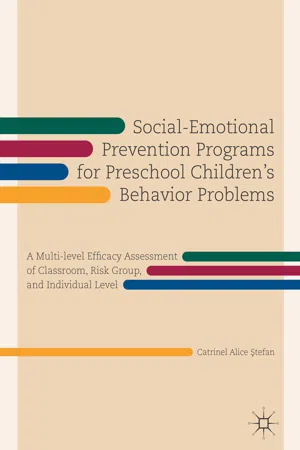Several epidemiological studies indicate that incidence rates for early onset behavior disorders are rapidly increasing, and behavioral markers of such disorders can be identified in 5–25% of preschool children (Snyder 2001). Also, about 50% of children with moderate to severe symptoms of externalizing problems at this age continue to manifest similar problems after entering school (Webster-Stratton 1996; Webster-Stratton and Taylor 2001). Among those with continuing problems the most frequent diagnoses are oppositional defiant disorder (ODD), conduct disorder (CD), and attention-deficit hyperactivity disorder (ADHD) (Webster-Stratton 1996). This raised significant concerns as behaviors problems stemming from early childhood seem to be associated with long-term social adjustment problems such as peers’ rejection, delinquency, or substance abuse, as well as school related difficulties such as school dropout (Moffitt and Caspi 2001; Snyder 2001). One potential strategy for decreasing children’s risk for maladaptive behaviors is through implementing preventive strategies in school settings. Schools offer an invaluable opportunity to address the mental health needs of a large category of children, as research data suggest that 1 in 3 preschoolers is likely to manifest some sort of difficult behavior during preschool (Prinz and Sanders 2007).
Preventive programs delivered in schools are aimed at developing social-emotional competencies , as research has shown that children’s difficulties in this domain are associated with increased levels of aggression and non-compliance, behavioral markers of externalizing problems (Eisenberg et al. 2005a, b; Hastings et al. 2000). Additionally, some longitudinal studies have emphasized the relative stability of these competencies from preschool to adolescence (Abe and Izard 1999; Eisenberg et al. 2003), meaning that maladaptive interaction patterns become more resistant to intervention if they are reinforced over time. Given the burden which mental health problems place on children, their families, and society, as well as the compelling empirical evidence supporting the notion that early intervention programs targeting social-emotional development may be effective in preventing the escalation of maladaptive behaviors, it is important to investigate the underlying principles of developing these programs in order to understand how their efficacy could be enhanced (Nation et al. 2003; Nelson et al. 2003).
Defining Social-Emotional Competencies in Preschool Children
A large body of empirical evidence suggests that low levels of social-emotional competencies place children at increased risk of developing externalizing problems (Eisenberg et al. 2005b; Hastings et al. 2000). However, in order to understand how interventions target social-emotional development in preschool children , one must first define this set of competencies. Broadly stated, social-emotional competencies encompass a set of declarative and procedural knowledge which is necessary to understand and manage emotions, feel and show empathy towards others, as well as establish and maintain positive relationships with others (Mayer and Salovey 1997). Although social and emotional competencies are highly related, recent research has suggested that they are interconnected abilities, encompassing different knowledge and skills (Halberstadt et al. 2001). Therefore, in the following sections these competencies are described separately as emotional competencies and social competencies.
Emotional Competencies
A working definition of emotional competence states that it is the ability to effectively manage emotions which are elicited during social transactions (Buckley et al.
2003; Saarni
2001). In order to achieve competence in this respect, 3 types of abilities should be acquired: emotion recognition, emotional expressiveness, and emotion regulation, which are presented in Table
1.1 (Denham
2006).
Emotion recognition involves 2 sets of abilities: (1) expressive recognition meaning the ability to accurately label an emotion; and (2) receptive recognition involving the ability to identify an emotion based on facial cues (Denham
2006). Children who exhibit difficulties in recognizing their own emotions as well as other emotions are more likely to manifest difficulties in accurately decoding emotional cues (Dunn and Cutting
1999; Halberstadt et al.
2001). This is of particular importance during social interactions, in which mistakingly decoding a facial response as anger instead of sadness, could elicit negative interpretations about the other child’s intentions (“he does not want to share the toy”). Increased ability to recognize emotions is mostly predictive of children’s ability to manage emotions (Eisenberg et al.
2005a,
b; Schultz et al.
2001). Conversely, research confirmed that children who are less accurate in recognizing emotions are also likely to act aggressively, which in turn increases the probability of being at risk of
externalizing problems (Denham et al.
2001,
2002). Development of children’s emotion knowledge is mostly grounded in their learning experiences emphasizing the use of words describing emotions and discussions about emotions mainly during parent-child conversations (Eisenberg et al.
2003; Martin and Green
2005). These strategies were shown to elicit positive effects on children’s ability to effectively regulate emotions and display prosocial behaviors (Denham et al.
2000; Izard et al.
2001).
Table 1.1Emotional and social competencies in preschoolers and their corresponding skills and behaviors
Competence | | Skill | Behavior |
|---|
Emotional competence | | 1. Emotion knowledge | Expressive/receptive recognition |
2. Emotion expressiveness | Predominantly positive expression |
3. Emotion regulation | Adaptive self-regulatory strategies |
Social competence | 1. Interpersonal | Problem-solving | Turn taking, sharing, waiting, etc. |
Peer relations | Involvement in cooperative play |
2. Intrapersonal | Compliance with rules | Active compliance |
Frustration tolerance | Delaying rewards |
The second component of emotional competence, emotional expressiveness, refers to the ability to convey messages containing features of emotions (i.e., mostly facial expressions) in a socially acceptable manner (Denham 2007). Emotional expressiveness is generally equated in t...
